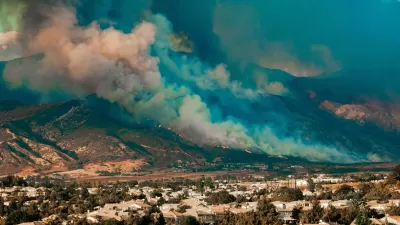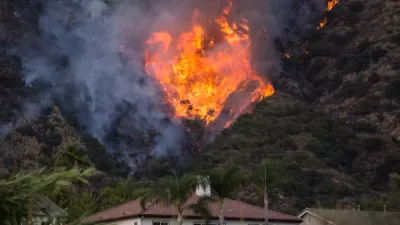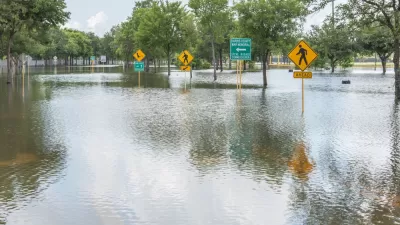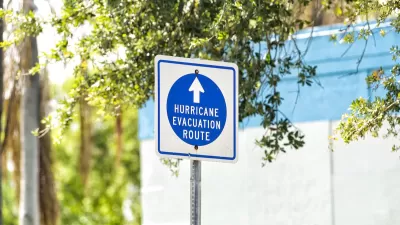Homeowners in the state are finding it increasingly difficult to secure insurance policies thanks to the growing risks of wildfire, drought, and other climate threats.

With State Farm, “the largest property-insurance company in the country retreating from the country’s largest property-insurance market,” it’s becoming abundantly clear that homes in California, Arizona, and other western states are becoming uninsurable thanks to growing threats from wildfires and other disasters.
Curbed writer Alissa Walker points out that the dire situation has been compounded by decades of housing policy resistant to density that “has historically pushed new development into the flammable fringes of cities known as the ‘wildland-urban interface’.”
For Walker, the solutions offered by the state, such as creating its own insurer for high-risk areas and providing guidance for real estate developers and cities, are just band-aids. The crisis requires a bigger, less politically palatable action: “The state should simply not allow people to live in high-fire-risk areas in the first place.”
The burgeoning crisis isn’t unique to California, Walker adds, and other places should take note. “Insuring the uninsurable in the face of increasingly pervasive climate risk will be a challenge everywhere and not just for wildfires.”
According to a Yahoo News article by Ben Adler, insurance rates for some Florida homeowners have doubled in the last year “with some insurance companies threatening to drop them if they don’t make expensive alterations, such as a new roof made of hurricane-resistant materials.”
FULL STORY: California Is Becoming Uninsurable

Planetizen Federal Action Tracker
A weekly monitor of how Trump’s orders and actions are impacting planners and planning in America.

Congressman Proposes Bill to Rename DC Metro “Trump Train”
The Make Autorail Great Again Act would withhold federal funding to the system until the Washington Metropolitan Area Transit Authority (WMATA), rebrands as the Washington Metropolitan Authority for Greater Access (WMAGA).

DARTSpace Platform Streamlines Dallas TOD Application Process
The Dallas transit agency hopes a shorter permitting timeline will boost transit-oriented development around rail stations.

Supreme Court Ruling in Pipeline Case Guts Federal Environmental Law
The decision limits the scope of a federal law that mandates extensive environmental impact reviews of energy, infrastructure, and transportation projects.

Texas State Bills to Defund Dallas Transit Die
DART would have seen a 30% service cut, $230M annual losses had the bills survived.

Bikeshare for the Win: Team Pedals to London Cricket Match, Beats Rivals Stuck in Traffic
While their opponents sat in gridlock, England's national cricket team hopped Lime bikes, riding to a 3-0 victory.
Urban Design for Planners 1: Software Tools
This six-course series explores essential urban design concepts using open source software and equips planners with the tools they need to participate fully in the urban design process.
Planning for Universal Design
Learn the tools for implementing Universal Design in planning regulations.
Roanoke Valley-Alleghany Regional Commission
City of Mt Shasta
City of Camden Redevelopment Agency
City of Astoria
Transportation Research & Education Center (TREC) at Portland State University
US High Speed Rail Association
City of Camden Redevelopment Agency
Municipality of Princeton (NJ)





























